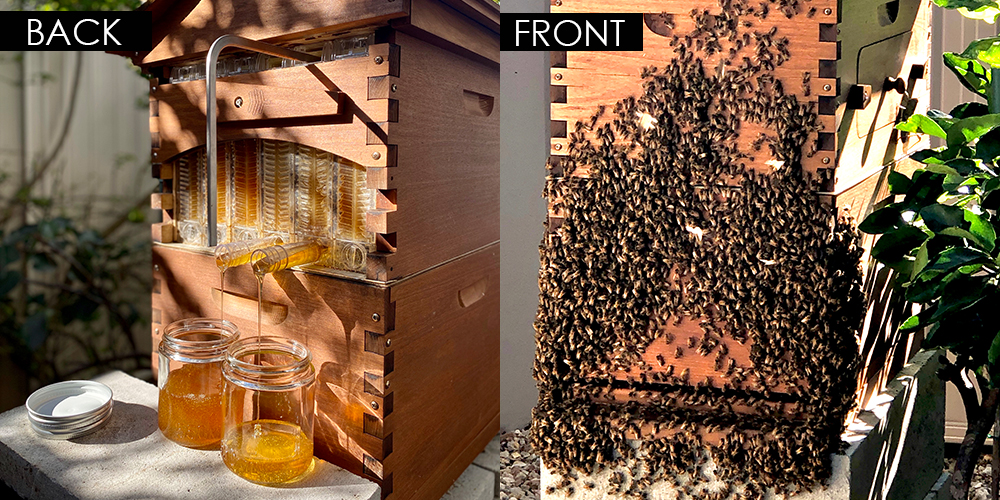- Tags: "Gold Coast Community", "Gold Coast Property", "How to", "News", "Palm Beach", "Top Read".
Save the bees, they make your honey!

PHOTOS: Rhys Wildermoth's harvest from Sunday 9th August (on the left) and his buzzing friends (on the right). Just as we’re rolling out of bed and searching for our first coffee hit in the morning, thousands of honey bees are also warming up their wings and flying from their hive in search of something a little sweeter.
Of course there’s the honey. But us humans often forget the most important job that our buzzing friends do is pollinating edible plants.
Here is how you can do your bit in your backyard to help our bees before spring!
1. Hedges
Give the shears a rest if your hedge is about to flower. Many people cut off new growth during flowering times which means the bees miss out on precious nectar opportunities.
2. Clover in the lawn
Resist the temptation to spray clover, bees need it to forage.
3. Herbicides and pesticides
Insect populations are declining, including bees, so switch to an organic approach to gardening – you can get just as good results with organic products.
4. Perennials and herbs
Try buying some smaller plants that encourage bees like rosemary, thyme, lavender, salvia, echinacea, heliotrope, cornflower, echium, or plectranthus.
5. Bee seed mix
If you want a cheap, no-fuss way to create an instant wild flower garden for your local bees, buy a “beneficial bug” or “bee flower” seed mix at the nursery or online. Scatter seeds over soil or in a pot in spring. You’ll find several varieties of herbs and small flowering plants emerge in an array of colour and form.
6. Green roofs and verge gardens
Can you utilise an empty rooftop or verge to create a low-maintenance native garden? Pigface, banksia, grevillea, tea-tree, dwarf gum trees, midjim berry and even hardy edible herbs can be mixed in. Mixing native and exotic plants into the overall landscape should give your buzzing mates a succession of flowering times through the seasons.
7. Native bees
We have around 1500 native bee species in Australia. You can buy them online and have them arrive in the post.
8. European beehive
Why not go all out and become a beekeeper? It’s so much easy than you might think to set up your own hive at home. Think about that delicious honey you'll have too!
It’s totally achievable to create a garden that can be included in a bee’s stopover, giving them and other beneficial insects a habitat and food source. Your edible garden and fruit trees will prosper and the diversity of plants – managed with an organic approach – will create a more robust and healthy garden environment for you (and our bees) to enjoy.
Rhys Wildermoth, Sales agent from First National Palm Beach, has set a bee hive up in his backyard garden to increase pollination and save the bees. He's also planning on setting a second one up! "My two kids love watching these little busy bees," he said. "I've been putting the honey in preserving jars that I bought from Kmart and been bringing these to work, my colleagues love it. They are also the perfect little gifts for honey lovers," Rhys said.
Yes, we understand that this isn’t for everyone, but if you have the space in your backyard and the interest, becoming a beekeeper can be a fun hobby and a great way to make side cash by selling honey. Rhys can help you get started, just give him a buzz on 0405 140 914.
SOURCE: Domain, Byron Smith, Aug 5 2020.
by Celine Battendier
Save the bees, they make your honey!
palmbeachfn.com.au August 2020
First National Palm Beach
Cnr of 6th Ave & Cypress Terrace, Palm Beach, QLD 4221
Ph: 07 5559 9600
